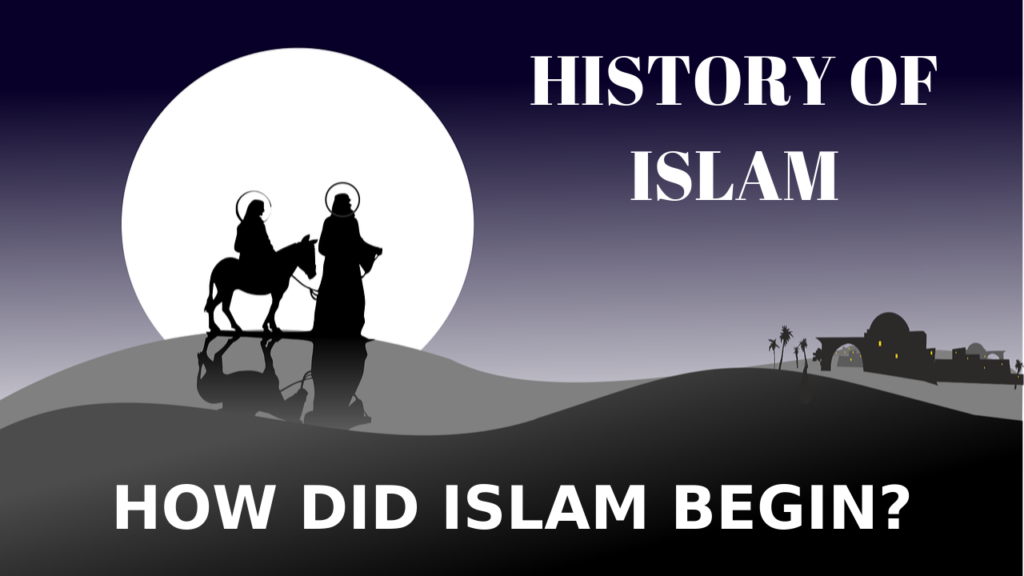When Did Islam Begin? The question of Islam’s origin is not just a historical puzzle; it is the bedrock of a belief system and way of life for over a billion people worldwide. As one of the major world religions, Islam’s beginnings are shrouded in mystery and majesty, making it a subject of fascination for scholars, historians, and anyone interested in global heritage. To unravel the complexity of this vast topic, we’ll take a journey back to pre-Islamic Arabia, walk through the life of the Prophet Muhammad, and explore the birth of Islam, its early expansion, and its profound impact on the world.
Islam, one of the world’s largest and fastest-growing religions, has a history of over 1400 years. The rise of this monotheistic religion has had a significant impact on different cultures and societies around the globe.
In this article, we will explore Islam’s origins and beginnings, from its inception in the 7th century to how it has evolved into a global religion in modern times.

Pre-Islamic Arabia: The Cradle of Islam
Before Islam emerged, tribal societies roamed the vast deserts of the Arabian Peninsula. These were times of pagan worship, where numerous deities found their abode in the enormous Arabian skies. The Kaaba, a cube-shaped shrine in Mecca, drew pilgrims from across the region to worship the idols it housed. Trade was the Peninsula’s lifeblood, connecting the oasis cities to bustling markets as far as Persia and the Byzantine Empire. However, the society was deeply entrenched in tribal customs, with blood feuds and vendettas casting long shadows.
This era was marked by a social and economic divide, with the majority facing hardships while a few thrived. Amidst this backdrop, the stage was set for a revolutionary change that would redefine the region and beyond.
Life of Prophet Muhammad: The Teacher and the Taught
Born in Mecca around 570 CE, Muhammad was destined to be a reformer. He was a shepherd, a merchant, and contemplative by nature. At 40, he began to receive revelations from the Archangel Gabriel, which would become the cornerstone of the religion he would establish. These verses, later compiled into the Quran, preached monotheism and called for social justice, an end to idolatry, and the fostering of a strong community, regardless of social status.
Muhammad, a man of remarkable patience and compassion, faced opposition from his tribe and the ruling elite of Mecca. Despite persecution, the message of Islam continued to spread, attracting the marginalized, the oppressed, and those disillusioned with the status quo.
The Birth of Islam: A New Dawn

The momentous night journey to Jerusalem and the subsequent migration to Yathrib, later known as Medina, marked a turning point. The Muslim community began to take shape, with clear principles of governance outlined. The first Muslims, including close allies like Abu Bakr and Ali, converted under duress yet with conviction.
The constitution of Medina provided a framework for a pluralistic society where Jews, Christians, and Muslims could coexist under the new order. The arrival of the Yazidi in Medina cemented a denial of faith with military action. The city of Mecca eventually saw Muhammad’s return and its inhabitants’ conversion, leading to the purification of the Kaaba and the establishment of Islam as the foremost faith in Arabia.
Expansion of Islam: A Spiritual and Geographic Odyssey
The passing of the Prophet marked the beginning of an expansion that would see Islam stretch from the Iberian Peninsula to the Indian subcontinent. Under the Caliphs, Islamic armies carried Muhammad’s message to the known world’s far reaches. The conquerors brought the sword and a fertile intellectual tradition that would shape a Golden Age in Islamic history.
The Rashidun and Umayyad Caliphates were periods of expansion and consolidation, with administrative foundations laid and a body of jurisprudence emerging. Scholars and translators undertook the monumental task of preserving and translating the works of ancient civilizations, laying the groundwork for future scientific, literary, and cultural achievements.
Impact of Islam: Traces of a Great Civilization
The influence of Islam is not confined to the religious sphere but extends to nearly every domain of human endeavor. Architectural marvels like the Alhambra and Taj Mahal, the intricate beauty of Islamic art and calligraphy, and the contributions in mathematics, medicine, and philosophy bear witness to the richness of this legacy. Islamic scholarship transmuted the wisdom of the Greeks and Persians, adding their inimitable style.
The Quranic injunction for inquiry and learning led to the establishment of the House of Wisdom in Baghdad, a beacon of knowledge and translation. Muslim scholars were in dialogue with counterparts in Byzantium and Western Europe, transmitting the scientific advances that would ignite the Renaissance. The soulful strains of Islamic music and the Sufi mystics’ poetry continue to resonate with seekers and connoisseurs alike, reflecting Islam’s cultural influence.
The Everlasting Impact
The story of Islam’s beginning is not just a journey through time but a tapestry of human spirit, resilience, and transformation. From the nomadic tribes of Arabia to the pinnacles of Al-Andalus, the faith of Islam has embodied a dynamic force reshaping the world in both subtle and profound ways. Its message of unity and peace, its call for knowledge and progress, and its rich tapestry of art and culture contiue to ignite the hearts and minds of a global community.
Enduring Contributions
As we conclude, it’s undeniable that the legacy of Islam is ongoing, and its teachings are perennial. Its past is inseparable from its present, and its future is intertwined with the aspirations of humanity at large. For those who seek a glimpse into the history of this remarkable faith, the journey to its beginning is a quest worth undertaking, enriching our understanding of a heritage shared by humanity. So, let us continue to learn and reflect on the story of Islam, for it is a story that will never end. However, it also continues to evolve and thrive, leaving its mark on every corner of the globe and impacting our world.
Let us embrace this legacy with open hearts and minds as we unravel the story of Islam, a faith that continues to inspire and guide millions of believers worldwide. Let us strive to embody its message of compassion, justice, and unity as we navigate our journeys toward a better future for all humanity. May the story of Islam continue to resonate with generations to come, shaping a better world for us all. So here ends our journey, but let it also serve as a beginning to a lifelong pursuit of understanding and appreciation for the remarkable faith of Islam. As-Assalam-o-Alaikum – peace be upon you. Alhamdulillah – praise be to God.
Bismillah – in the name of God.
May we always remember the impact of Islam, and may it always guide us towards a more harmonious and enlightened world. So, let us journey onwards with the spirit of Muhammad’s teachings as our guiding light, for his legacy will never end. Let this be our lasting tribute to him, and may we honor his memory by striving toward the values that he so beautifully embodied. As we close this chapter on the birth of Islam, let us also remember that its story will continue to unfold in our hearts, shaping our present and inspiring our future.
Indeed, as long as there are believers who carry the torch of faith, the legacy of Islam will live on, leaving an indelible mark on the world and eternity. And so we bid farewell to this journey, but let us carry its lessons with us, for they are the foundation of Islam’s everlasting impact. May we never forget the profound significance of this remarkable faith, and may it continue to guide and inspire us for generations to come. As-salamu alaykum – peace be upon you. Alhamdulillah – praise be to God.
FAQS
1. When did Islam start? or When Did Islam Begin?
The start of Islam is traditionally traced back to the 7th century in Mecca, with the revelations received by the Prophet Muhammad. However, many Muslims would argue that Islam has always existed as a faith and way of life, with prophets and messengers throughout history bringing the same message of monotheism and submission to God. So, while its official beginning may be traced back to a specific time, the essence of Islam and its teachings have been present since the beginning of humanity.
2. How old is Kaaba?
The Kaaba, the holiest site in Islam, is said to have been built by the Prophet Abraham and his son Ishmael around 2000 BCE. This makes it over 4000 years old. It has undergone many renovations and reconstructions since then but remains an important symbol of faith for Muslims worldwide. The current structure dates back to the early 7th century, shortly after the birth of Islam.
3. What is the significance of the year 622?
The year 622 CE marks the beginning of the Islamic calendar and is known as Hijra or migration. During this time, Prophet Muhammad and his followers migrated from Mecca to Medina in search of a safe haven for their faith. This event also marked the beginning of the Muslim community or ummah and is seen as a turning point in Islam’s history. It is also significant because it marks the start of the Islamic lunar calendar, which is still used today.
4. How did Islam spread from Arabia to other parts of the world?
Answer: Under the Caliphs, Islamic armies carried Muhammad’s message to the known world’s far reaches, leading to an expansion that saw Islam stretch from the Iberian Peninsula to the Indian subcontinent. This was driven by armed conquests and a fertile intellectual tradition that attracted converts and shaped a Golden Age in Islamic history.
5. What role did Islamic scholars play in the development of knowledge and science?
Answer: Islamic scholars played a significant role in developing knowledge and science by preserving and translating the works of ancient civilizations, establishing institutions such as the House of Wisdom in Baghdad, and engaging in dialogue with counterparts from other regions. This led to advancements in various fields, such as mathematics, medicine, philosophy, and art, that would later influence Western Europe during the Renaissance. Their emphasis on inquiry and learning also laid the groundwork for future scientific, literary, and cultural achievements. So, we owe a debt of gratitude to these scholars for their contributions to human progress.
6. What cultural influences can be attributed to Islam throughout history?
Answer: Throughout history, Islam has had a profound cultural influence on the world. Its art and calligraphy are renowned for their intricate beauty and have inspired artists across different cultures. The rich tradition of Islamic music, poetry, and literature continues to captivate hearts and minds worldwide. Its message of unity, peace, and social justice have also shaped various cultural practices. At the same time, its emphasis on education and knowledge has had a lasting impact on the development of societies. Overall, Islam’s cultural influence is vast and continues to resonate with people from different backgrounds. So, we can see how this faith has left its mark on the world through its diverse and rich cultural contributions.
7. How does the story of Islam continue to unfold in our present and shape our future?
Answer: The story of Islam continues to unfold in our present and shape our future through its teachings and values that guide the lives of millions of believers around the world. Its compassion, justice, and unity message remains relevant today, where conflicts and divisions still exist. It also inspires individuals to seek knowledge and progress, leading to advancements in various fields. Additionally, the legacy of Islam is carried on through the hearts and actions of its followers, who strive to embody its message daily.
Therefore, as long as there are people who hold on to the principles of Islam, its story will continue to unfold and shape our future for the better. Let’s remember that we are all part of this ongoing story and have a role to play in its continuation.
8. How can we honor the legacy of Islam and Muhammad in our lives?
Answer: We can honor the legacy of Islam and Muhammad in our daily lives by following his teachings and striving for compassion, justice, and unity in all we do. We can also learn more about the faith and its history, spreading awareness and understanding to combat misconceptions and promote harmony. Additionally, we can live by the values of Islam, such as kindness, generosity, and tolerance, in our interactions with others. Ultimately, by embodying the principles of Islam in our actions and behaviors, we honor its legacy and pay tribute to the great Prophet Muhammad (peace be upon him).
Conclusion
In summary, Islam began with the revelations received by Muhammad in 7th century Arabia. It spread rapidly through the efforts of Muhammad and his followers, eventually becoming a global religion with over 1.8 billion believers today.
The Quran and Five Pillars are essential aspects of Islamic faith and practice, guiding individuals and communities to live according to God’s will.
As we continue to witness the growth of Islam worldwide, it is essential to understand its beginnings to gain a deeper appreciation for its rich history and teachings. We hope this article has provided valuable insights into the origins of Islam and how it has evolved. We invite you to explore further and continue learning about this fascinating religion. Salaam! (Peace be upon you!)
The End. Just kidding, there’s no end to learning about Islam. The journey of Islam continues, and it is up to each individual to embark on their path towards understanding and practicing this faith. May we all strive for unity, compassion, and peace in our pursuit of knowledge and connection with God. As the Quran teaches, “Read! In the Name of your Lord who has created (all that exists)” (96:1)







